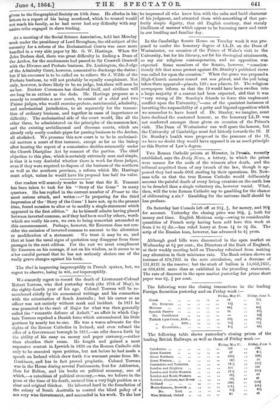At a meeting of the Social Science Association, held last
Monday week under the presidency of Lord Brougham, the old subject of the necessity for a reform of the Ecclesiastical Courts was once more handled in a very able paper by Mr. G. W. Hastings. When Sir John Dodson died, there was great difficulty in finding a Dean of the Arches, for the emoluments had passed to Sir Creswell Creswell with the Divorce and Probate business. Dr. Lu.shington, the Judge of the Admiralty Court, however, consented to discharge the duties ; but if his successor is to be called on to relieve Sir J. Wilde of the Probate business, he will not probably be equally complaisant. Not only, however, is there likely to be no judge, buthere will soon be no bar. Doctors Commons has dissolved itself, and civilians will ere long be as extinct as the dodo. Mr. Hastings proposes as a remedy to constitute a new court, to consist of a chief and two Puisne judges, who would exercise probate, matrimonial, admiralty, and ecclesiastical jurisdiction, to sit separately for the transac- tion of ordinary business, and together in cases of importance or difficulty. The ecclesiastical side of the court would, like all the other three, be administered on the principles of the common law, and the existing archidiaconal and diocesan courts, which are already only costly conduit-pipes for passing business to the Arches, all abolished. We presume this new court is to be in ecclesiasti- cal matters a court of first instance, except so far as the bishop after hearing the report of a commission decides summarily under the Church Discipline Act by consent of the parties. The chief objection to this plan, which is certainly extremely neat and simple, is that it is very doubtful whether there is work for three judges, even if they were required to dispose of the business of the northern as well as the southern province, a reform which Mr. Hastings must adopt, unless he would have his proposal lose half its- value.






























 Previous page
Previous page